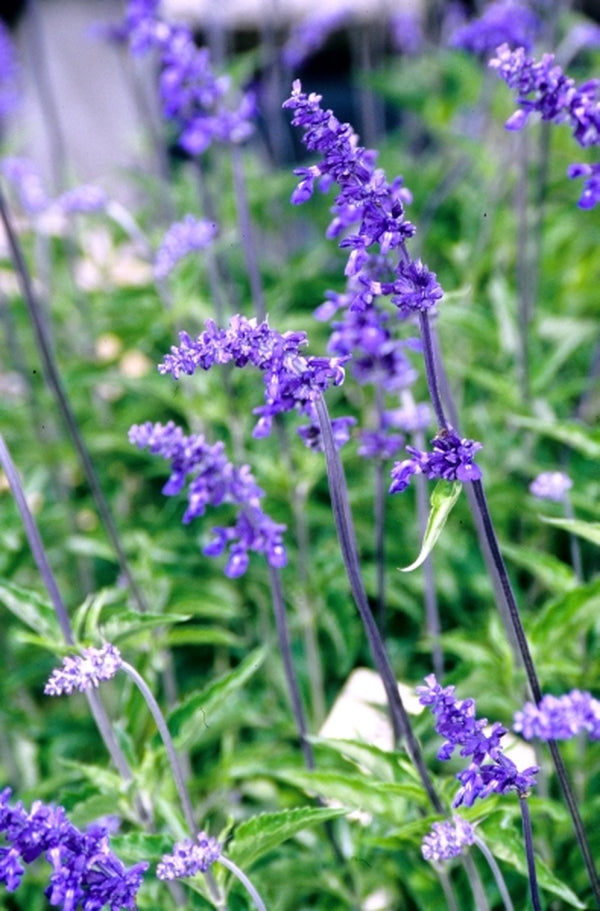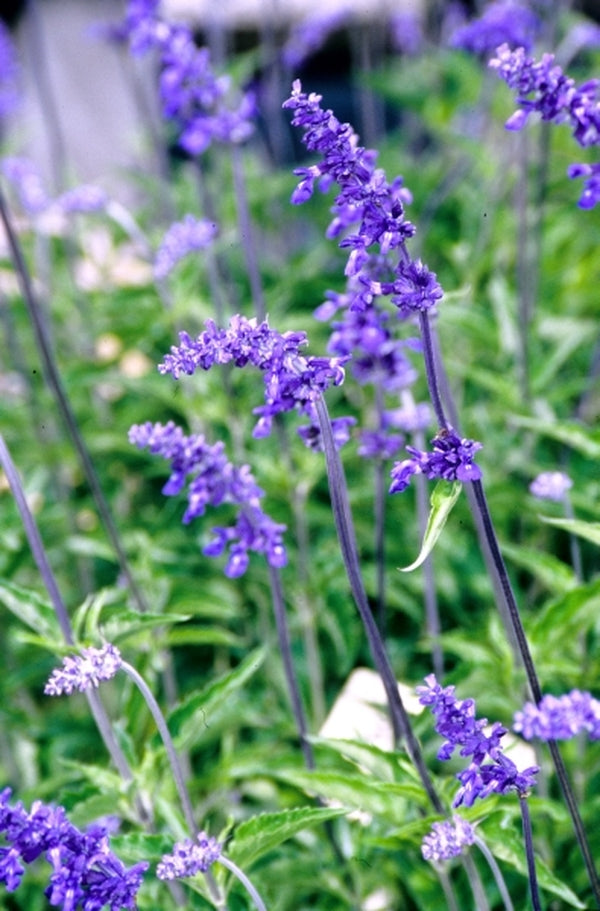Salvia farinacea 'Henry Duelberg'
Henry Duelberg Mealy Cup Sage
This plant is not currently for sale. This is an archive page preserved for informational use.
Shop Available SalviaItem #: 6822
Zones: 7b to 9b, at least
Dormancy: Winter
Height: 36" tall
Origin: United States
Pot Size: 3.5" pot (24 fl. oz/0.7 L)
From Greg Grant's infamous cemetery wanderings comes another clone of the US native (Oklahoma west to Arizona) Salvia farinacea, this one from the Texas gravesite of Henry Duelberg. 'Henry' is a bit taller than his better half (Salvia farinacea 'Augusta Duelberg'), making a 2' tall x 3' wide clump of glossy, green foliage, topped with long 1' spikes of dark royal purple-blue...a hangout for hummingbirds. This phenomenally heat- and drought-tolerant selection is for the full-sun gardener who kills everything else. Soggy soils are about the only thing that will send these to meet their namesakes.
Maintenance:
In the wild, Salvia farinacea is a prairie native that can be found growing on alkaline soils at elevations as high as 6000'. In the garden, Mealy Cup sage is a low maintenance perennial, that's also widely grown as a summer annual where it isn't reliably winter hardy. We have also found it to grow quite well on slightly acidic soils under garden conditions.
In the ground, Salvia farinacea can be cut to the ground in mid-to-late summer, if it gets looking a bit raggedy, and it will pop right back in a matter of weeks. We do not recommend cutting it back in fall, since the stems are hollow and tend to fill with freezing water in cold winters. Once the new plants have begun to sprout at the base in spring, they can be cut to the ground at that time.
Growing Conditions:
Salvia farinacea fares best in well-drained soils that stay on the fairly dry side, although it's quite tolerant of rain events. Full sun also produces the most dense, best flowering plants, although it will also be successful in part sun.
Natural Impact:
Salvia farinacea is a favorite of native bumblebees, butterflies, and hummingbirds, so if you enjoy having a pollinator garden, this is a great salvia for you.

-
Related Articles
- How to Build a Pitcher Plant Bog
- Dear Deer - We're Closed for Dinner
- The Top Hummingbird Attracting Plants for Your Garden
- Cutting Through the Jungle - Native Plants Myths and Realities
- Perennial Salvia Plants - Ornamental Sages for the Garden
- Name that Plant - The Misuse of Trademarks in Horticulture
- When Should I Plant My Plants?
- The Top 6 Coolest Blue Salvia for the Garden
- The Top 25 Butterfly Plants
- How to Build a Butterfly Garden
- Hummingbirds in the Garden
-
Other Attributes
Genus: Salvia
Flower Color: Blue
Leaf Color: Green
Bloom Time: Fall , Spring , Summer
Container Role: Thrillers
Garden Themes: Cottage Garden Plants , Green Roofs , Living Wall , Night Gardens , Southwest Garden Plants
Other: Fragrant Foliage Plants , Butterfly Attracting Plants , Cut Flower Plants , Deer Resistant Plants , Drought Tolerant Plants , Hummingbird Plants , Pollinator Plants , Medicinal Plants , North American Native Plants , Plants that Attract Birds , Rabbit Resistant Plants , Salt Tolerant Seaside Plants , Texas Native Plants , Xeriscaping Plants , United States Native Plants

